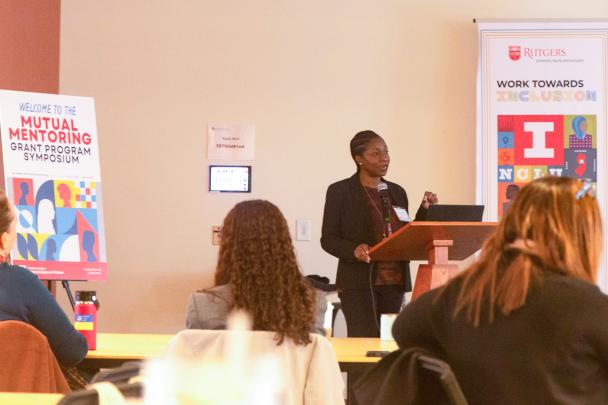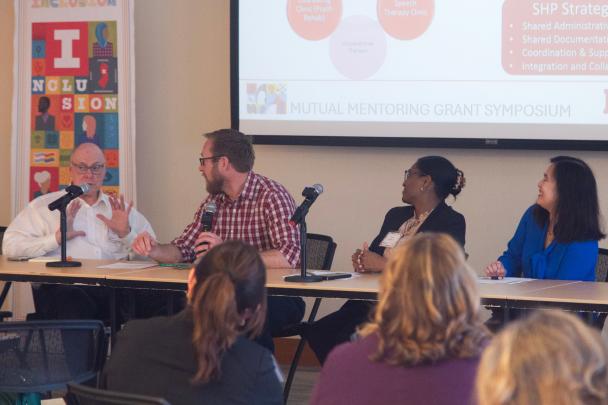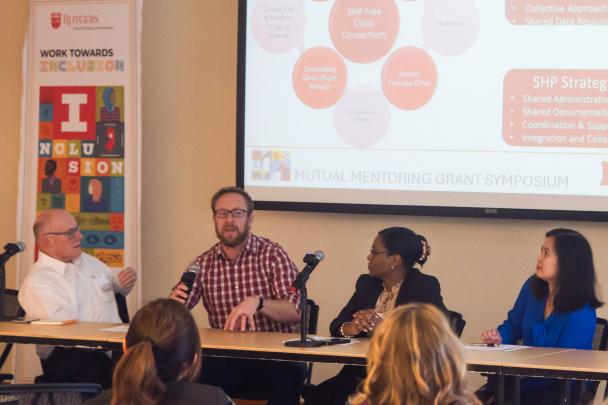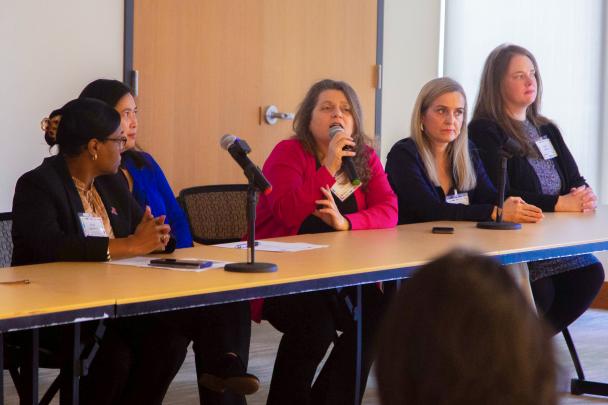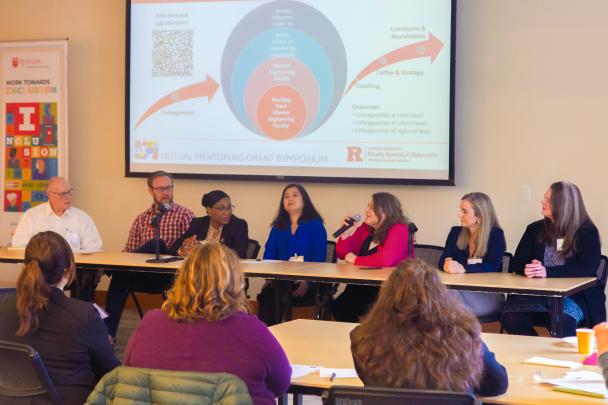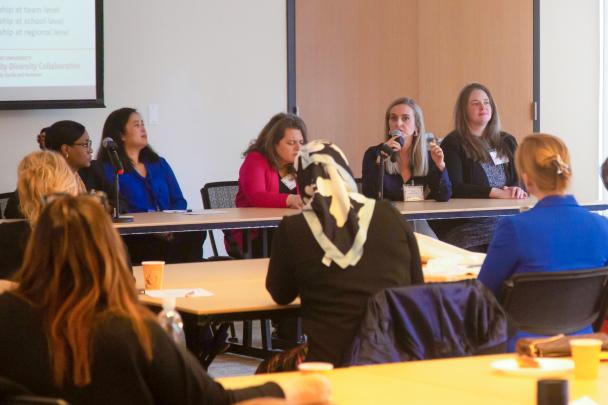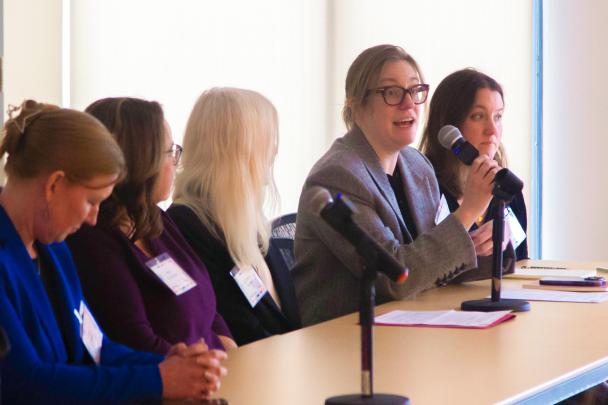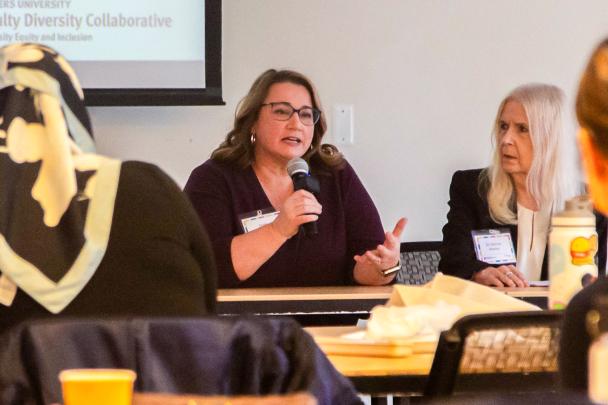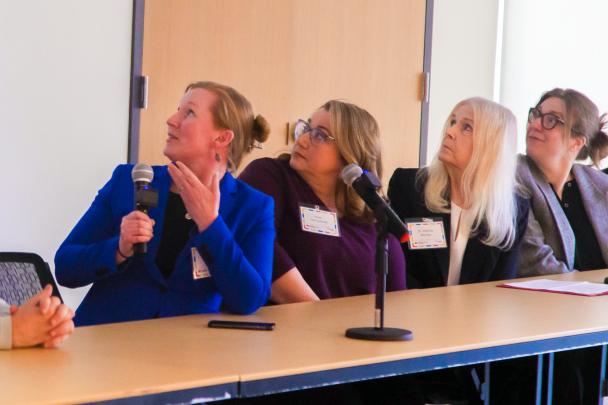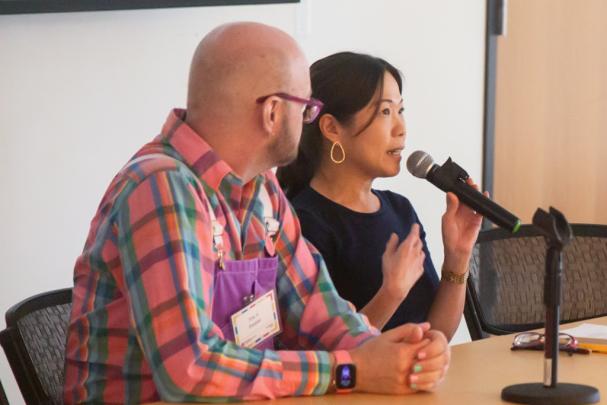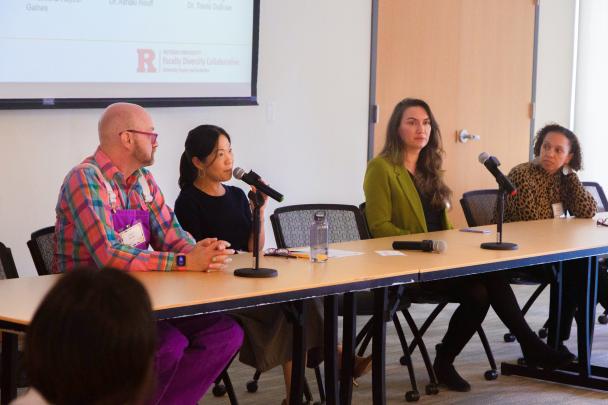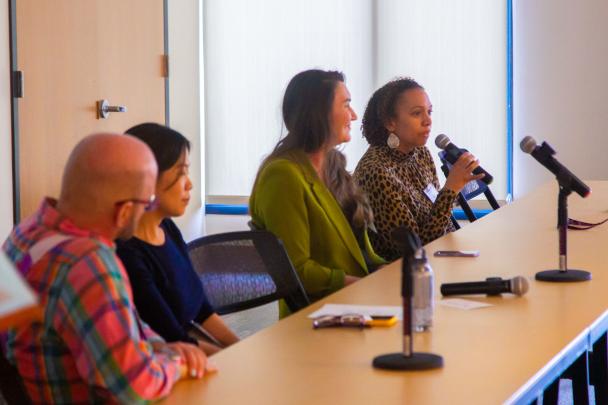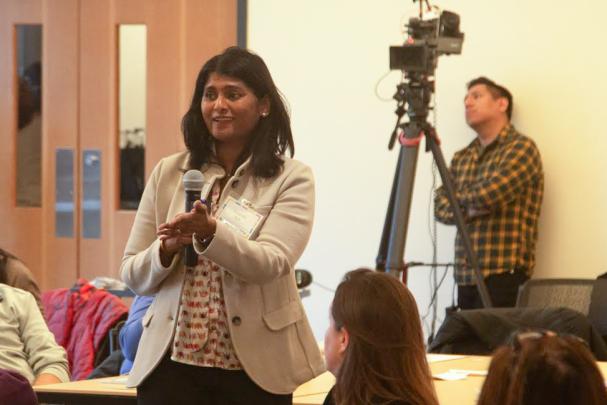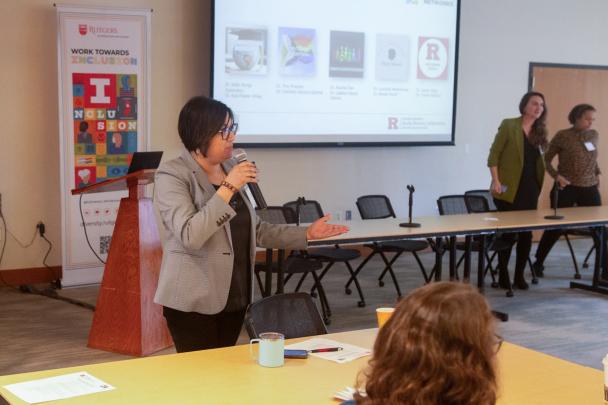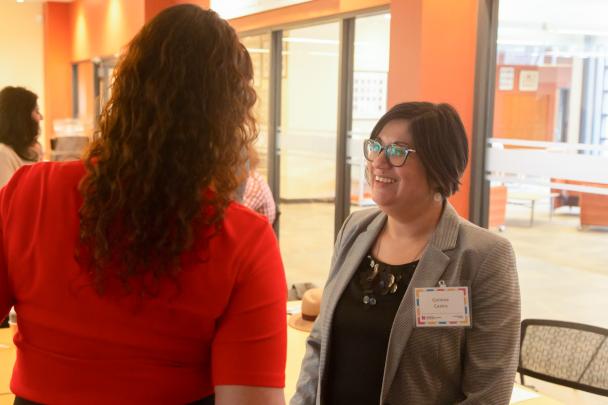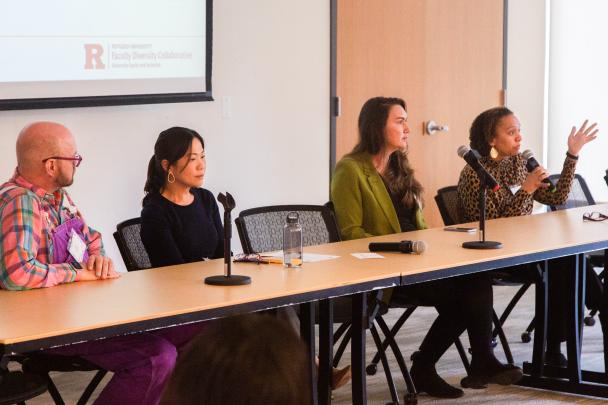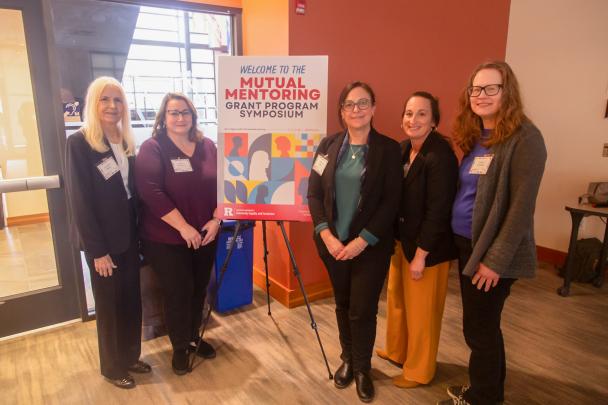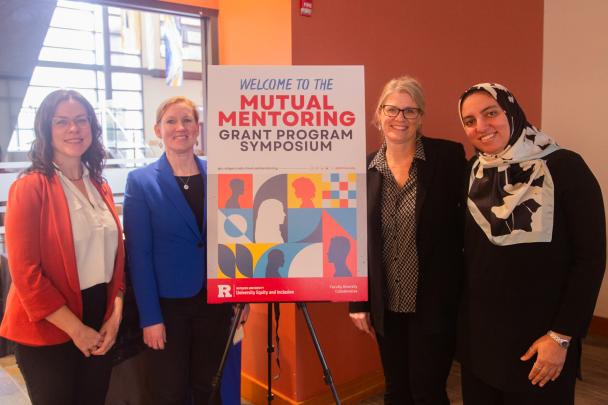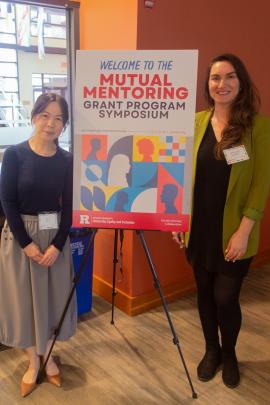Tuesday, March 03, 2026, 10:00 a.m.-12:30 p.m. | New Brunswick Theological Seminary, 35 Seminary Place New Brunswick, NJ 08901 United States
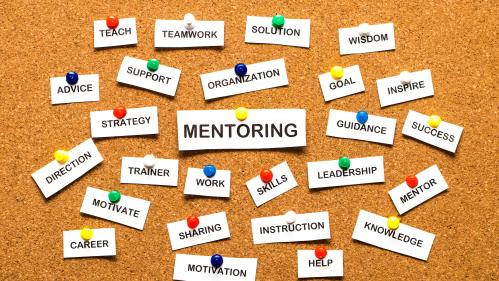
Mutual Mentoring Grant Program
Supporting the full spectrum of needs to sustain a diverse faculty
What is Mutual Mentoring?
The Mutual Mentoring program supports faculty at any career stage in developing robust mentorship networks, within and outside of Rutgers University, to combat isolation and ensure all faculty have the resources they need to thrive.
The Mutual Mentoring Program, developed at the University of Massachusetts-Amherst, is an established vehicle for providing comprehensive support to faculty that also gives them agency in defining the modes of support that will be most useful to support their success.
“Mutual Mentoring” distinguishes itself from the traditional 'top-down' model of mentoring by:
- Encouraging the development of non-hierarchical, collaborative networks where each person provides specific areas of knowledge and experience.
- Forming network relationships that benefit both the person traditionally known as the “mentee” as well as the person traditionally known as the “mentor.”
Mutual mentoring has been proven to support faculty by helping them to develop their professional identities, promoting their well-being and job satisfaction, and improving productivity. Studies consistently find that mutual mentoring relationships lead to increased research output, more effective teaching, more dynamic networks, and improved tenure and promotion prospects. It nurtures vital social connections with colleagues who can provide advice, encouragement, and feedback over the course of a faculty member’s professional life.
Mutual Mentoring Research
-
Abstract: In the beginning, “Mutual Mentoring” was little more than an idea, a hopeful vision of the future in which a new model of mentoring could serve as a medium to better support early-career and underrepresented faculty. Over time, Mutual Mentoring evolved from an innovative idea to an ambitious pilot program to a fully operational, campus-wide initiative. This article describes the conceptualization, design, implementation, and evaluation of a Mutual Mentoring initiative from 2006 to 2014. Findings indicate that faculty members who participated in this initiative were more likely to regard mentoring as a career-enhancing activity as well as to develop mutually beneficial mentoring relationships than were their non-participating peers.
-
Excerpt: In this model, early-career faculty build robust networks by engaging multiple "mentoring partners" in non-heirarchical, collaborative, cross-cultural partnerships to address specific areas of faculty activity, such as research, teaching, working towards tenure, and striking a balance between work and life.
Grant Award Types
Accordion Content
-
1. Provides support of up to $1500 per award to individuals who develop a focused mentoring network (comprised of up to three individuals – the applicant and up to two on-campus or off-campus mentoring partners
OR
2. Provides matching funds of up to $1500 for participation in the National Center for Faculty Development and Diversity (NCFDD) Faculty Success Signature Programs. (NCFDD Faculty Success Program or NCFDD Post-Tenure Pathfinders program). The source of matching funds (e.g., personal research and/or department level funds) must be disclosed.
-
Provides support of up to $6000 per award and supports networks of four or more faculty. Team grants may include a mix of types and ranks of faculty, as long as the majority of individuals meet the eligibility criteria.
Four Priority Mentoring Areas
1. Getting to Know the Institution
- Understanding the academic culture of departments, schools/colleagues, and the institution; identifying resources to support scholarship and skill building; creating a trusted network of junior and senior colleagues.
2. Developing a Support Network
- Forging career-enhancing relationships with faculty (at Rutgers or outside the institution) who share similar interest, challenges, and/or opportunities. Particularly encouraged are networks that eliminate isolation, including those that support the diverse needs of underrepresented faculty, mid-career faculty, and faculty interested in future leadership roles.
3. Excelling at Research
- Developing a research/writing plan, identifying sources of internal and external funding, soliciting feedback on manuscripts and grant proposals, setting up and running a successful laboratory, or identifying outside scholars who could be external reviewers.
4. Understanding Promotion and Tenure
- Better understanding of the tenure and promotion process – both for promotion to associate and promotion to full professor ranks, learning more about the criteria for evaluating research and teaching performance, finding support in developing the promotion dossier, soliciting feedback on the quality and quantity of work through the annual faculty review.
Eligibility
We welcome proposals from full-time Rutgers faculty on continuing appointments. We strongly recommend individuals interested in submitting a team and/or individual grant attend an information session on preparing a complete proposal.
Evaluation Criteria
Quality of the Mentorship Project
- Proposal outcomes are detailed and clearly stated and build on the Mutual Mentoring model.
- Clear alignment between intended outcomes and activities that address one or more of the priority mentoring areas.
Feasibility
- Proposal activities are well-planned and can realistically be accomplished in the grant period.
- Budget is reasonable, detailed and, when possible, provides contingencies for both remote and in-person cost to support the goals of the proposal.
Impact
- Proposal describes how the project will affect the faculty member’s professional goals, and rationale for this request to the Mutual Mentoring Program at this time.
Information Session
Watch the 2025 Mutual Mentoring Grant Program Info Session!
Contact the FDC
If you have additional questions or want to get in touch with the FDC Team, contact us at fdcollab@rutgers.edu.
Frequently Asked Questions
Eligibility
-
You may apply as part of a Team grant application and also submit an Individual grant application during the same round. However, given that the Mutual Mentoring Grant Program is highly competitive, the review committee will consider equity of distribution of resources among faculty applicants.
-
Full-time tenure track faculty, and full-time non-tenure track faculty on continuing appointments are eligible for the Mutual Mentoring Grant Program.
-
Part Time Lecturers, voluntary faculty appointments and Librarians are not eligible for individual grants, however we encourage them to partner with other faculty as a mentoring partner or as a core team member if the team already has four faculty who are on the tenure track, or non-tenure track with continuing appointments.
-
The Core Team is comprised of Rutgers faculty who are invested in the mutual mentoring project, have participated in its development, and will engage throughout the project year in its administration. Eligible core team members are full-time tenure track faculty and non-tenure track (NTT) faculty on continuing appointments. Core team is comprised of four or more faculty and may include a mix of types and ranks of faculty or administrators, as long as the majority of the individuals on the core team meet the eligibility criteria. Mentoring partners do not play as key a role in the implementation of the project. They also can be faculty from other institutions.
Proposal Format
-
Please answer each of the questions within the word count limit.
-
Heads/Chairs are required to review the project. It is recommended to contact them early on in the application process as you are developing your proposal to avoid the possibility of last-minute unavailability.
Proposal Criteria
-
Your application does not need to include a mentor's confirmation that they will participate in the project. It is, however, important to demonstrate in your proposal that you have clear mentoring objectives and plans for addressing those areas. You may include potential mentors who you believe would participate in your project.
-
If you are wondering whether your idea is suitable for a Mutual Mentoring grant application: first, review the guidelines, look at past examples, and consider the MM priority areas to see if your project fits within these parameters. Past examples on grant projects can be found on the UMASS Mutual Mentoring site where the program first originated. Also, the Faculty Diversity Collaborative welcomes your questions, so feel free to contact us.
-
We would like to see proposals that clearly identify a listed Priority Mentoring Area, have well-articulated project goals, and expected outcomes, as well as describe what impact funding the project will have on future success for the participant(s). Projects should also build upon the Mutual Mentoring model by creating a network of support for participant(s), and help promote an understanding of Equity, Inclusion and Diversity, and/or investment in relationship building across difference. Finally, budget expenses should adequately demonstrate and justify purpose of funding.
-
- Intra-departmental, Inter-departmental, Interdisciplinary, Cross-institutional and Affinity-based team proposals with a clear mentoring component are encouraged to be submitted.
- Affinity-based proposals for example could propose the creation of mentoring groups/ networks for Women in STEM, LGBTQ Scholars, Diverse Academic Leaders etc.
Budget
-
You can ask for reimbursement for those costs that are directly related to carrying out your mutual mentoring project, under the guidelines of Rutgers Travel and Business Expense Policy. It is recommended that you review your budget with your department's budget officer in advance of submission.
-
Yes, emeritus faculty members can be included as a mentoring partner, but only be compensated for their participation according to university guidelines.
2024-25 Mutual Mentoring Grant Awardees
Team Grant Awardees
-
Team Members: Annalisa Scacchioli, Kimberly Cook-Chennault, Lisa Klein, Tara Cominski, and Doreen Glodowski Trotta
Chancellor-led Unit: Rutgers–New Brunswick
The RUtgers-NEtwork of Women FACulty in Engineering (RU-NEWFACE), is a diverse and inclusive network of engineering women faculty, where Non-Tenure-Track (NTT) and Tenure-Track/Tenured (TT/T) women faculty collaborate through mentoring, leadership, and colleagueship to support professional development and advancement, and to build visibility for women faculty within the School of Engineering.
-
Team Members: Cassandra Nelson, Anne Carr-Schmid, Haiyang Lu, Suzanne Piotrowski, and Anastasia Bailey
Chancellor-led Unit: Rutgers–New Brunswick
The purpose of this mutual mentoring team grant is to create a collaborative network, encourage professional development, and provide guidance and support for non-tenure track (NTT) faculty promotion within the Division of Life Sciences (DLS).
-
Team Members: Catherine Clepper, Kristina Keating, Alex Dika Seggerman, and Kate Brown
Chancellor-led Unit: Rutgers–Newark
The cross-unit Rutgers–Newark Caregivers Task Force fosters community, institutional knowledge and advocacy, and professional advancement for faculty caregivers by dedicating time to our collaborative research efforts assessing and supporting caregivers’ needs on the Rutgers-Newark campus.
-
Team Members: Dione Sandiford, Monina Franco-Tantuico, Rowena Curva, and Annie Pajaro
Chancellor-led Unit: Rutgers–Newark
The purpose of the Mutual Peer Mentoring Network is to empower and support faculty in the Center for Clinical Learning and clinical faculty in the School of Nursing. This Peer Mentoring Network will provide faculty with space, time, and resources to embrace their full potential as leaders in nursing education.
-
Team Members: Elena Lahr-Vivaz, Jennifer Austin, Lacey Hunter, Maria Kennedy, and Stephanie Rodriguez
Chancellor-led Unit: Rutgers–Newark
RU-IYBI brings together tenure and non-tenure stream faculty who are pursuing community-engaged projects across multiple disciplines in the humanities to share experiences, learn new skills, expand their professional networks, and create tools to navigate both general project management issues and those specific to Rutgers as an institution.
-
Team Members: Jill Ripper, MD; Anthony Rosania, MD; Ronald Ikechi, MD; Samantha Lleras, MD; and Sarah Dunn, MD
Chancellor-led Unit: Rutgers–Newark
MoneyRx: Empowering Junior Attendings with Financial Health through Mutual Mentorship is a novel financial literacy program to empower junior physicians by providing practical financial skills and knowledge, enabling them to navigate their financial landscape over a lifespan more confidently. It seeks to address unique financial hurdles encountered by junior faculty.
-
Team Members: Laura Ramirez Polo, Manuel E. Jimenez, Kendra Dickinson, Karen T. D'Alonzo, and Zorimar Rivera-Núñez
Chancellor-led Unit: Rutgers–New Brunswick
The Cross-cultural and Cross-linguistic Excellence and Enrichment in Research (CrEER) group endeavors to advance cross-cultural and cross-linguistic collaboration in community-based research. The goal is to leverage the strengths and knowledge within and outside Rutgers to combat the lack of orientation and professional isolation experienced by faculty conducting multilingual community-based research.
-
Team Members: Lynnette Mawhinney, Carla Murphy, and Jhanae Wingfield
Chancellor-led Unit: Rutgers–Newark
This proposed project plans to build a collective structure to mitigate the physical, metal, emotional, and spiritual side effects of being Black women working in higher education. Our group, Sis, You Good? uses critical professional development norms (Kohli et al., 2015) specific to diversity, equity, inclusion, and justice community-based scholars.
-
Team Members: Rahul Mittal, Frederick D. Coffman, Andrew D. Lynch, and Celeste Domsch
Chancellor-led Unit: Rutgers Health
The H.O.P.E mutual mentoring network will allow opportunity for diverse faculty to get together to exchange ideas on a regular basis, for existing interdisciplinary teams, sharing ideas on funding and team research, connecting with expertise on and off campus to improve collaboration between all involved in the delivery of the clinic.
-
Team Members: Sara Elnakib, Ruth Carll, Kathleen Howell, Emanuel DiCicco-Bloom, and Maria Gloria Dominguez Bello
Chancellor-led Unit: Rutgers–New Brunswick
Rutgers Cooperative Extension faculty, dispersed across New Jersey, face challenges, including limited access to university resources, isolation, and addressing complex community issues. The BRIDGE program addresses these with self-reflection retreats, peer-to-peer forums for sharing plans of work, and skill-building sessions, fostering collaboration and support for pre-tenure extension faculty.
-
Team Members: Sheila Tabanli, Crystal Akers, Selin Bengi Gümrükçü, Lena Sandberg-Golden, Courtney Sobers, Mike Woodbury, and Laura Silverstein
Chancellor-led Unit: Rutgers–New Brunswick
Our purpose is to improve connections with our colleagues and Rutgers as an institution while immersing in President Holloway's "Beloved Community" vision to nurture a non-hierarchical network of untenured faculty. Through experiential learning, workshops, and a faculty-led celebratory event we aim to expand faculty's sense of belonging and scholarly productivity.
-
Team Members: Suchismita Ray, Vaishali Singhal, Weili Liu, Lena Sandberg Golden, and Courtney Sobers
Chancellor-led Unit: Rutgers Health
Asian American women in STEM (science, technology, engineering, and mathematics) face the challenges of being both overrepresented as Asian Americans and underrepresented as women. It proposes establishing an affinity group for diverse female faculty researchers to provide essential support for research, professional growth, and promote diversity, equity, and inclusion (DEI).
-
Team Members: Victoria Eugenia Guadalupe Abraira, Brian Daniels, Santiago Cuesta, Zhaomeng Niu, and Tammy Chung
Chancellor-led Unit: Rutgers Health
Our project addresses the gap in lab management and leadership skills among early career biomedical scientists, especially those from marginalized backgrounds. It focuses on preparing these individuals for the complexities of lab leadership, acknowledging the unique challenges faced by scientists from diverse ethnic, gender, and sexual orientation backgrounds.
-
Team Members: Yoona Kang, Tamara Nelson, Andrew Abeyta, and Natasha O'Brown
Chancellor-led Unit: Rutgers–Camden
We are a diverse and interdisciplinary group of social scientists at Rutgers-Camden who intend to tackle our field's issue of over-reliance on studying Western, Educated, Industrialized, Rich and Democratic (WEIRD) populations. Our aims are threefold: Build a supportive network, address the WEIRD problem in our research practice, and educate students.
Individual Grant Awardees
-
- Ebony Ruhland, Associate Professor at Rutgers–Newark, Criminal Justice
- Evelyn Arana, Assistant Professor at Rutgers Health, Medicine
- Jiawei Sophia Fu, Assistant Professor at Rutgers–New Brunswick, Communication
- Joanelle Bailey, Assistant Professor at Rutgers Health, Surgery
- Kevin L. Clay, Assistant Professor at Rutgers–New Brunswick, Educational Theory, Policy, and Administration
- Umer Hassan, Assistant Professor at Rutgers–New Brunswick, Electrical and Computer Engineering
- Valerie Jones Taylor, Associate Professor at Rutgers–New Brunswick, Psychology
2023-24 Mutual Mentoring Grant Awardees
Team Grant Awardees
-
Team Members: Nathan Fried, Kimberlee Moran, Jamie Dunaev Price, Travie Dubose, Tracy Paulson, and Jennifer Oberle
Chancellor-led Unit: Rutgers–Camden
This cross-unit Rutgers–Camden NTT Mutual Mentoring Network will create an emotional, structural, and institutional support system catered specifically to the needs of NTT faculty to promote belonging, professional development, capacity building and leadership development.
-
Team Members: Keith Green, Stacy Hawkins, Lisa Lewis, and Oscar Holmes IV
Chancellor-led Unit: Rutgers–Camden
The Blackademics project will strengthen the informal network of Black academics on the Camden campus through organized events and the creation of systems for mentoring, visibility, collaboration, and community building.
-
Team Members: Patricia O'Brien-Richardson, Sharifa Williams, Annette Freytag, Adrian Gale, Corina Hernandez, Madinah Elamin, Briana Bivens, Darnell Thompson, C. Alex Gray, and Anthony Jones
Chancellor-led Unit: Rutgers–New Brunswick
The Scholarly Practitioners Collective (SPC) will deepen collaboration and apply equity values to mentoring relationships within this interdisciplinary team. The team will build their capacity for academic publishing and publicly-engaged scholarship by establishing a collaborative sustainable writing practice related to student engagement and anti-oppressive advocacy.
-
Team Members: Sheila Tabanli, Laurent Vera, Lyra Stein, and Anna Kornienko
Chancellor-led Unit: Rutgers–New Brunswick
This Faculty Affinity Network (FAN) will support the needs of a diverse, interdisciplinary, early-career, non-tenured teaching faculty from historically marginalized groups in STEM fields, particularly in relation to the promotion process, work-life balance, and writing productivity.
-
Team Members: Ana Pairet Vinas, Selin Bengi Gumrukcu, Lorraine Piroux, Ileana Nachescu, Dafna Lemish, Wiehong (Grace) Guo
Chancellor-led Unit: Rutgers–New Brunswick
This mentoring network will bring together a group of international female scholars from different disciplines at Rutgers, primarily to create a support network and secondarily to increase scholarly productivity.
-
Team Members: Doaa Rashed, Jenny Yuan-Chen Yang, Nela Navarro, Howaida Wahby Eraky, and Carmela Scala
Chancellor-led Unit: Rutgers–New Brunswick
The Women Affinity Network for Transnational NTT (WANT-NTT) will create critical and transformative mentoring opportunities for non-tenure track transnational faculty at Language Departments at Rutgers who are usually women and, generally, women of color. This affinity group requires the development of unique mentorship spaces and opportunities that address their unique positionality at Rutgers University.
-
Team Members: Bernadette Baird-Zars, Danielle Falzon, Jack Bouchard, Andrea Restrepo-Mieth, Todd Vachon, and Mark Paul
Chancellor-led Unit: Rutgers–New Brunswick
Junior Faculty Climate x Equity Mentoring Collaborative represents faculty from an array of different identity groups who share a common desire to connect climate-related social science and humanities questions to the places and communities they work in through engaged scholarship. This mentoring collaborative will allow for a substantive expansion of the team’s scholarly networks within Rutgers and beyond and establish a cross-disciplinary and non-hierarchical network to encourage personal development, career strategy, and well-being of team members.
-
Team Members: Marshall Jones, Frederick Curry, Marc Handelman, Cameron Knight, Jeff Friedman, David Gordon, Heather Hart, Don Holder, Anne McPherson, Marjoris Regus, and Scott Ordway
Chancellor-led Unit: Rutgers–New Brunswick
The EDI (Equity, Diversity and Inclusion) Arts Professors Mutual Mentoring group will foster networking, professional development, and fellowship through the creation of a new peer mentoring network of fellow artists and educators across Rutgers University. The group will foster collaboration through an enhanced understanding of participants’ artistry, and core principals of race & identity.
-
Team Members: Cleopatra Charles, Lindsey McDougle, Stephanie Newbold, and Ariane Chebel d'Appollonia
Chancellor-led Unit: Rutgers–Newark
SPAA Women Grant Writing Network will provide targeted support and resources for successful grant writing for faculty in the School of Public Affairs and Administration (SPAA). In addition to providing mentorship, the goal is to build a network of mentors and mentees who will work together to address systemic barriers that get in the way of successful grant writing by underrepresented faculty.
-
Team Members: Kimele Persaud, Karen Smith, Vanessa Lobue, Elizabeth Tricomi, Miriam Rosenberg-Lee, and Samantha Heintzelman
Chancellor-led Unit: Rutgers–Newark
This Mutual Mentoring program will focus on the development of a supportive and collaborative mentoring network of faculty across the Rutgers–Newark Psychology Department and community partners within the Newark area. Mentorship will allow team members to learn from each other about recruiting and working with diverse populations and better inform psychological and developmental science, while also providing a mechanism of support for its members as they navigate their research faculty careers.
-
Team Members: Ayana April-Sanders, Gwenyth Lee, Liping Zhao, Modupe Coker, and Guojun (Gary) Wu
Chancellor-led Unit: Rutgers Biomedical and Health Sciences
The Rutgers University–Growing Expertise in the Epidemiology of the Microbiomes (RU–GEMS) Mutual Mentoring project will establish a program of support, mentorship, and sponsorship for early career epidemiologists from junior, mid, and senior microbiome experts across RBHS with the goal of developing scientific and statistical expertise in the microbiome.
-
Team Members: Christine Ramdin, Jamey Lister, Tameika Minor, Sally I-Chun Kuo, Lewis Nelson, Zeeshan Ahmed, Stephen Crystal, and Danielle Dick
Chancellor-led Unit: Rutgers Biomedical and Health Sciences
The Polysubstance Tacklers Mutual Mentoring group will provide opportunities for collaboration and publication by creating a focused, personalized team of addiction researchers across Rutgers campuses who specialize in research relating to the co-use of opioids with other substances. Short- and long-term outcomes include collaborative research, grant acquisition, academic scholarship, and career development.
-
Team Members: Ann M. Nguyen, Jessica Hamilton, Tanya Saraiya, Farzin Khosrow-Khavar, Chintan Dave, and Todd Vachon
Chancellor-led Unit: Rutgers Biomedical and Health Sciences
The team will establish a peer mentoring network (PMN) focused on early career faculty who aim to promote equity at Rutgers through research, teaching, and service. Subgoals include: establishing transdisciplinary research collaborations, networking, and sharing information and resources.
-
Team Members: Darina Petrovsky, Marie Sizemore, Login George , Yanping Jiang, Elizabeth Luth, Michelle Chen, and Brett Millar
Chancellor-led Unit: Rutgers Biomedical and Health Sciences
This Mutual Mentoring network will build mentoring partnerships between peers at the Institute for Health, Health Care Policy, and Aging Research and senior faculty across Rutgers University. Project goals are to form a peer-to-peer pre-tenure mentoring network, excel at research by facilitating grants proposal and manuscript writing; and connect with peer and senior faculty both within and outside of the Institute whose research aligns with the team.
-
Team Members: Anuradha Reema Kar, Arianne Rayner, Julie Goswami, Huong Truong, and Danielle Velez
Chancellor-led Unit: Rutgers Biomedical and Health Sciences
The Women in Surgery Experience at Rutgers/RWJMS (WISER) will bring together early-to mid-career women faculty in surgical fields to encourage multi-directional mentorship across rank and specialty, rather than the traditional isolated resilience and stoicism that surgery has historically mandated. The primary goal of the WISER partnership is to help the core team design individualized career paths toward academic productivity and promotion.
Individual Grant Awardees
-
- Laura Porterfield, Assistant Professor at Rutgers–Newark, Urban Education
- Alessandra Williams, Assistant Professor at Rutgers–New Brunswick, Dance
- Mi Shih, Associate Professor at Rutgers–New Brunswick, Planning and Public Policy
- Latisha Forster Scott, Assistant Teaching Instructor at Rutgers–New Brunswick, Kinesiology and Health
- Meral Reyhan, Associate Professor at Rutgers Biomedical and Health Sciences, Radiation Oncology
- Priscilla Pinto Ferreira, Assistant Professor at Rutgers–New Brunswick, Geography and Latinx & Caribbean Studies
- Rahul Mittal, Assistant Professor at Rutgers–New Brunswick, Health Informatics
Mutual Mentoring Grants Program Symposium
Each year, we host a symposium featuring funded projects from the current grant cycle.
Attend to see the impact of faculty mentoring networks, learn about cross-campus collaborative projects, and leave inspired to create a new project to submit for the next grant cycle.
The symposium celebrates the creative ways faculty work together to advance a culture of mentoring and inclusion at Rutgers.
Explore Symposium Agendas
View 2025 Mutual Mentoring Grant Program Symposium Video
View Photos from Previous Symposiums
2024 Mutual Mentoring Grants Program Symposium
March 5, 2024 at the New Brunswick Theological Seminary
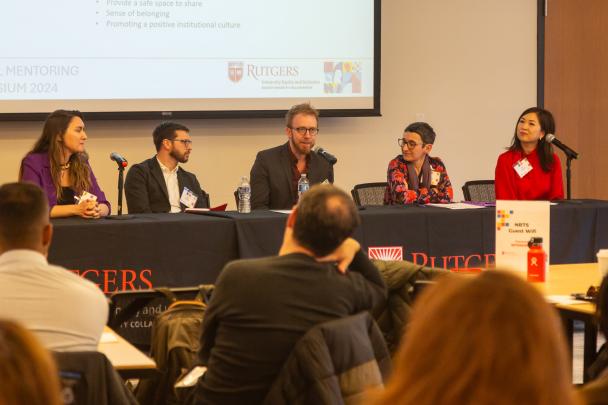
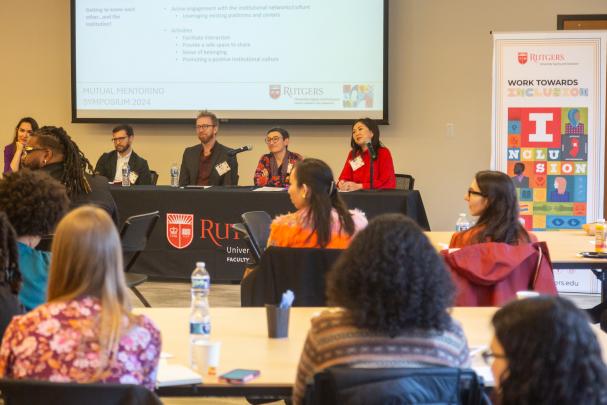
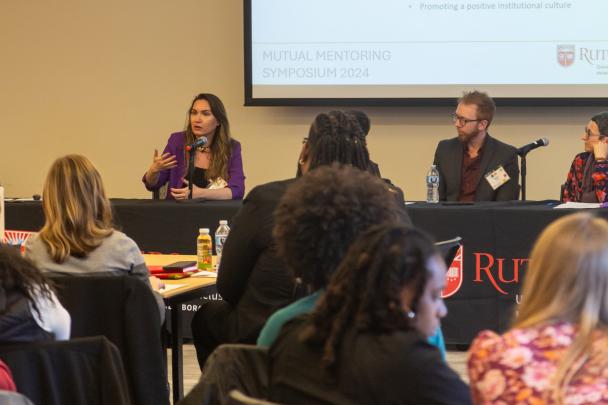
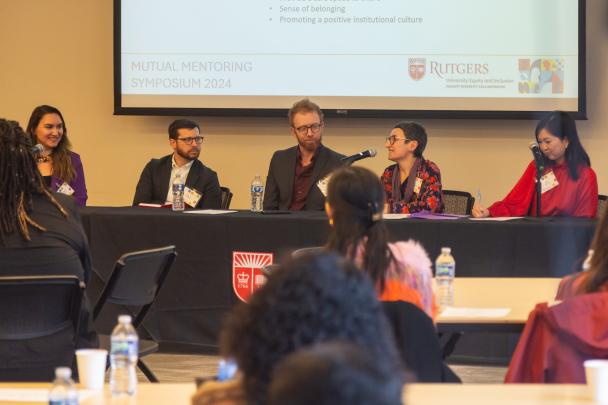
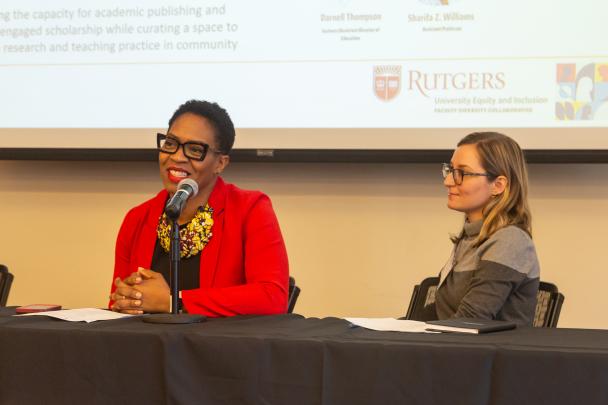
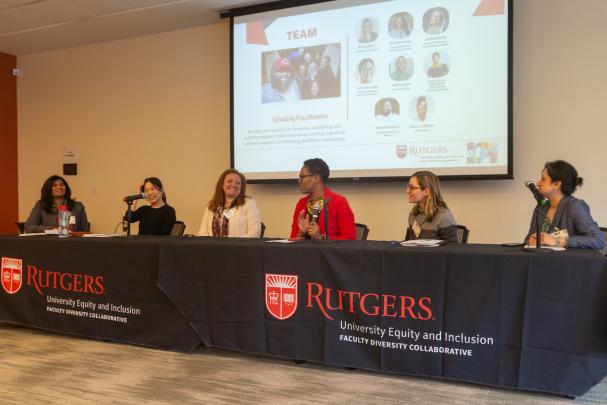
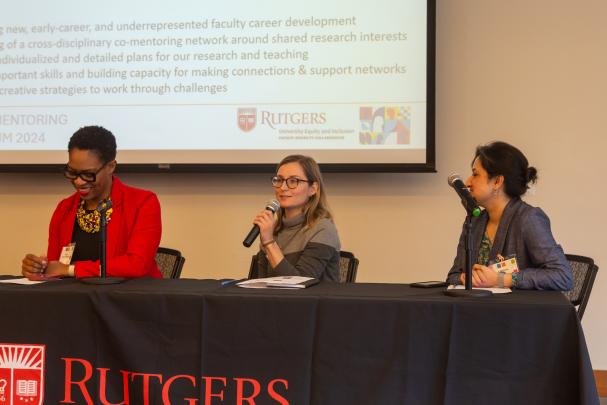
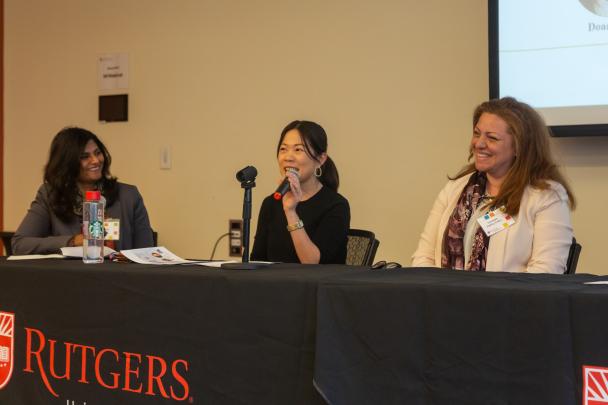
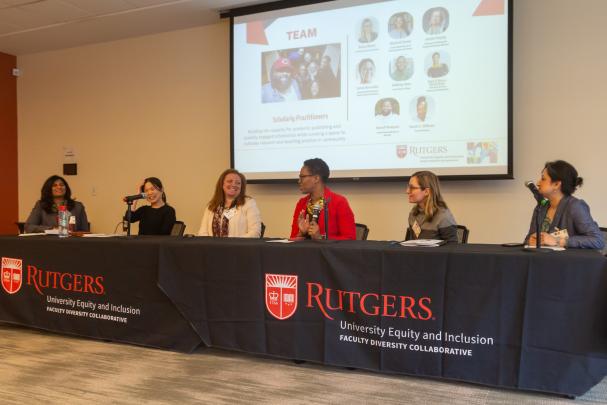
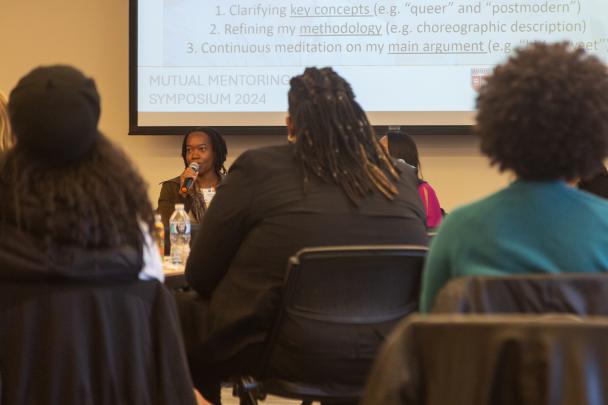
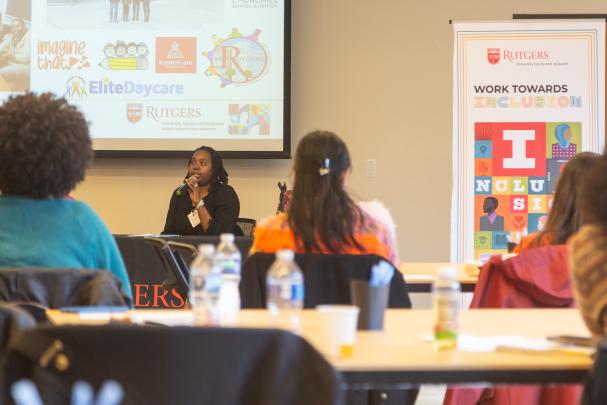
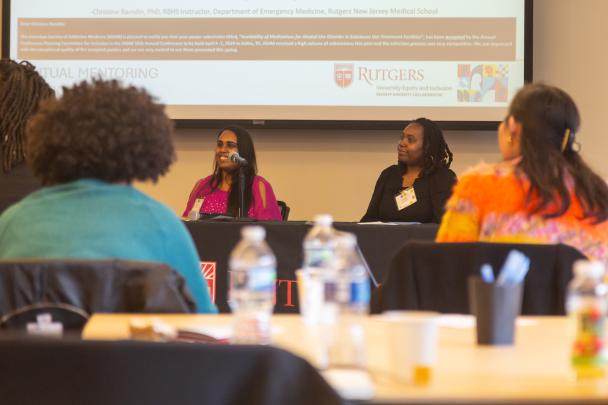
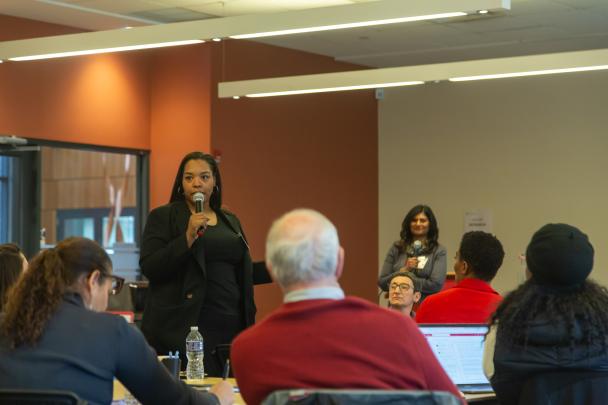
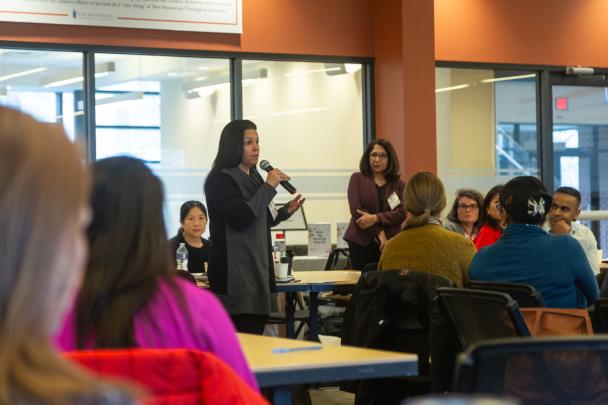
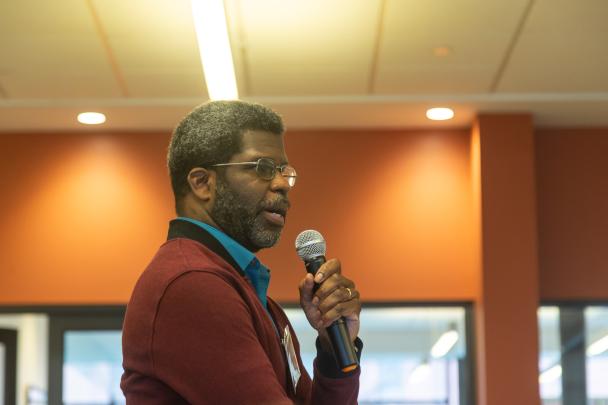
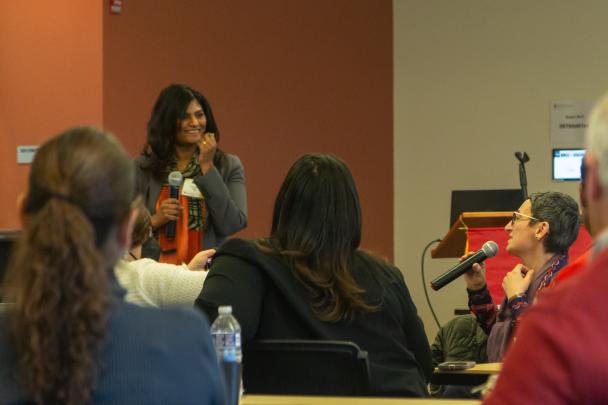
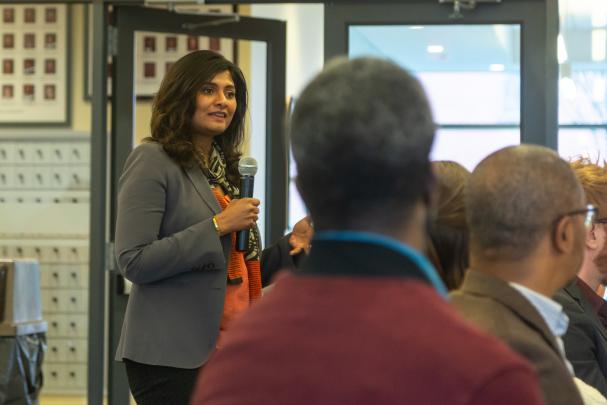
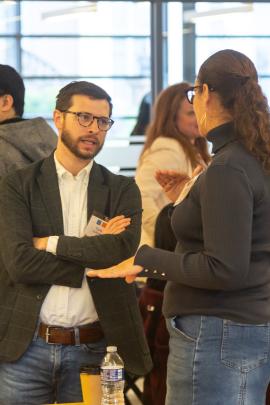
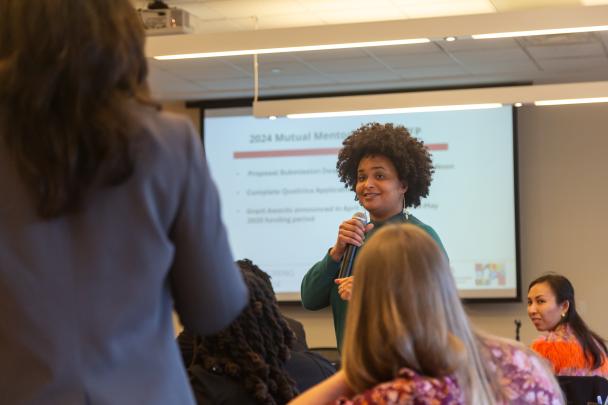
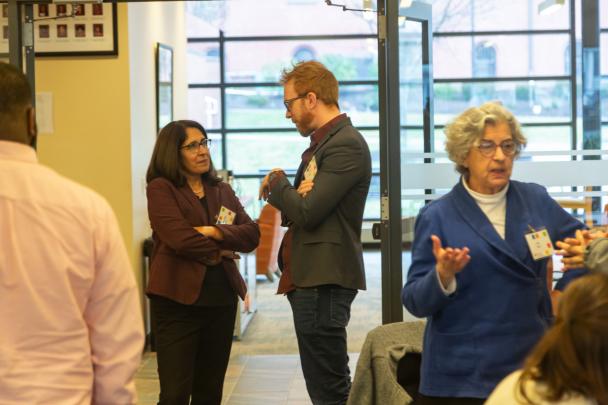
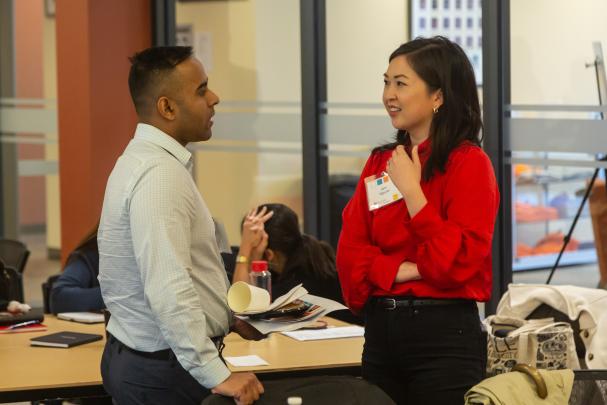
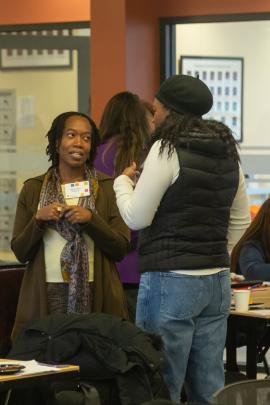
2025 Mutual Mentoring Grants Program Symposium
March 5, 2025 at the New Brunswick Theological Seminary
